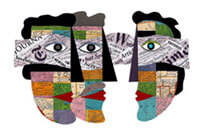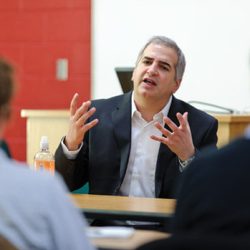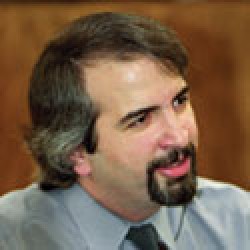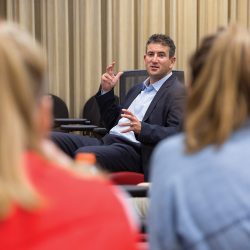Teachers Who Changed My Life
The note I received sophomore year from the dean of the College of Letters and Science read, “You must choose a major.” I knew that, but I simply enjoyed learning political science, art, history, and languages. Then, a journalism major I was dating suggested, on the slim evidence that I wrote good letters, that I try a writing course. I signed up for reporting and the literary aspects of journalism. A short time later, I had an epiphany. The men who taught those courses changed my life.
On the first day of my reporting class, a tall man wearing a trench coat and smoking a cigarette wrote his name on the blackboard: Owen Coyle. A Capital Times reporter, he had learned his trade on the streets of Chicago and looked like he could take care of himself in a tight spot. The first thing Coyle said was, “I love this business. You meet everybody from kings to bums.” I was electrified.
Wilmott Ragsdale taught literary journalism. Like Coyle, he was a sort of romantic character. With his bush jacket and mustache, he looked like a British explorer and exuded sophistication. He said that journalism is most often written against the merciless clock, but that some reporters, with a cultured eye and a deft way with language, produce work that approaches literature. He read passages aloud, so we could savor the magic.
One afternoon, during a reading from World War II, Ragsdale paused. He talked wistfully about D-Day, which he had covered for Time magazine. That fact seemed exotic enough. But then he added that, while on a troop ship steaming for Normandy, he had met another correspondent, Ernest Hemingway. My jaw dropped. This guy could teach me a lot.
A few weeks into the semester, on the way to Coyle’s class, I came upon an anti-war demonstration against the Dow Chemical Company, which was recruiting on campus. Dow made napalm, which was used to defoliate Asian jungles. I paused briefly. Unexpectedly, I saw Coyle and I asked if class had been canceled. “Class is right here today,” he said. (He had left a note on the classroom door.) “Cover this and do a story for Friday.” I was excited. Here was real news. For an aspiring reporter, could it get any better than that?
Since I walked down Bascom Hill for the last time in 1970, I have made my living as a writer. Whether I was working as a reporter in California, for national magazines in Manhattan, or in nonprofit communications in New York, Ragsdale and Coyle have continued to whisper in my ear. What they taught me — not just by shaping my writing, but by their values, accomplishments, and hard-won knowledge — made me a journalist. Their powerful lessons stayed with me for decades.
Ragsdale’s comments on my written work gave me confidence. I was also inspired that he had traveled the world, covered wars and presidents, and spoke a few languages. Years later, while reporting on a San Francisco immigrant community, I heard Ragsdale in my head. He reminded me to notice the small details that would illuminate the larger story, to record smells and colors, and to note bits of dialogue that could seem like poetry. I heard that voice many times.
As a young newspaperman working on San Francisco Bay Area papers, I covered everything from school boards and earthquakes to serial gay murders. One day, after the paper ran my police story about arrests during a night of youth-gang violence and gunshots, I had newsroom visitors — some of the guys in the story. They had tattoos, attitudes, and scars. Angry, they said my story got it wrong. We talked in a glass-walled city room office.
I was guided by the spirit of Coyle, who whispered: “Wade in, talk to some nasty people, keep your wits about you, remember every detail. Write tightly and well.” It was the most intense thirty minutes of my young life, but I survived, wrote an update, and emerged stronger.
Coyle eventually left journalism, becoming a mayoral press secretary and a governor’s speechwriter. We have kept in touch, but Ragsdale, sadly, passed away this January.
“If they ever find out we’d do this for free, we’ll all be in trouble,” Coyle once said. Over the years, I thanked Coyle and Ragsdale, master teachers and writers who were placed in my path at exactly the right moment, and made all the difference to a young man looking for a profession. I had always hoped to find work that would not seem like work. These men helped me do that.
Patrick Keeffe, a native of Madison, is a writer and journalist who has written for numerous publications, including The New York Times, Metropolitan Home, and Wisconsin Trails. He lives with his family in Huntington, New York.
If you’re a UW-Madison alumna or alumnus and you’d like the editors to consider an essay of this length for publication in On Wisconsin, please send it to onwisconsin@uwalumni.com.
Published in the Spring 2009 issue




Comments
No comments posted yet.